North Bank: Banking Sector in Iraq & Kurdistan Region 2014 Update
North Bank is the leading and largest bank in Iraq (Private). Mr Al-Jaff provides his latest overview of the banking sector in Iraq and he also discusses North Bank’s performance throughout 2013, current expansion plans for Iraq and Iraqi Kurdistan, and a project with Asiacell (Asiaviolet)―among others.
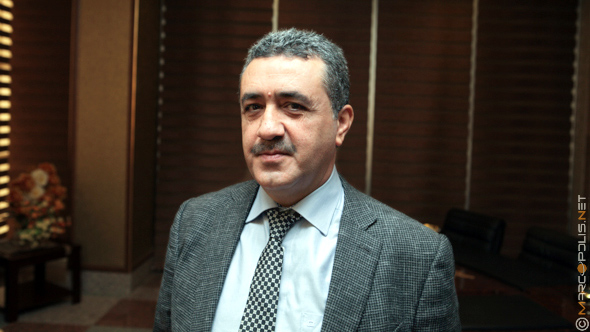
One of the challenges of private banking in Iraq is that only a certain percentage of banking operations can be done by private banks, for example government taxes always have to go through public banks. What is the result of this policy and do you see any change in the future?
We have actually discussed this matter many times in the economic committee of the Council of Ministers, which is the highest economic committee in Iraq. I am a member of that committee and I represent the private banks. We have asked them to change these laws and they are very keen to make steps towards that. However, the laws remain the same for now but we are pushing the issue to make sure that the private banks are more involved in the daily business of not only the private market but also the public market.
When do you think that this will happen?
I think it will happen sometime in 2014. Unfortunately we were hit by many political storms in 2012 and 2013 and so the situation remains and the committee is almost inactive. They were ready to make some very bold decisions to change some of the old laws and regulations but we came upon differences within the political parties. We hope that in early 2014 when we have new elections, we will be able to have a more stable look at these issues.
You are one of the few banks that managed to increase its capital to 250 billion Iraqi dinars as prescribed by the Central Bank. There are only 3 other banks that managed that same feat. How hard was it for North Bank to meet these targets? Also, as many smaller banks are struggling do you see any potential for takeovers?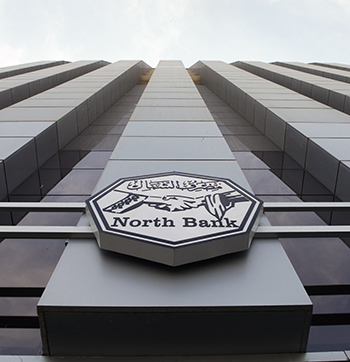
We were fortunate not to have any problems in raising this capital mainly because of our shareholders and clients and also because of the sincerity of those that work with us. We generated most of our capital from the profits that we made from way back when we were only 100 billion dinars strong. Each year we have raised capital from that in an easier proportion which has helped us and so we haven´t had to face the radical problems that other banks have faced.
What about targets for takeovers?
We have no intention today to takeover any other banks. We really think that North Bank is in its very early stages. We are hoping to be a big international bank with a lot of channels that cover the Iraqi market, which is one of the largest markets in the Middle East. We would like to concentrate on our own bank for now.
What is the growth outlook for the banking sector in Iraq in 2014?
All the banks will grow and eventually all the banks will meet the targets that have been mentioned by the Central Bank; simply because the Iraqi economy is so very big. There is room for many more banks to operate in Iraq in the near future. We are expecting a lot more competition coming from foreign banks but the Iraqi economy is big enough to absorb all of them.
Do you think we will see double digit growth or triple digit growth?
I think we will see excellent growth, especially for North Bank. We have done fairly well in the past years and I think our growth will be on the same track as far as profit gains.
Can you give us the latest updates on your financial performance, profitability, and returns on assets and equity? Also what are your expectations for 2014?
I think we will have a good double digit profit by the end of 2013. I would like to mention that some people were skeptical about the type of profits that we had. Our profits are not only from money exchange or transfers. In actual fact people coming to you to transfer their money for their daily business shows the kind of trust that they have in your bank. We are fortunate that people trust our bank. In general, these are not one single shot activities, rather it is people coming to make their daily deposits in our bank, from their revenues and the sales of their products which is also related to paying back their letter of credits and loans as a revolving matter to continue their daily business. In Iraq today we import more than 80% of our needs: agriculture, food, basic needs from all sorts of things like tissues, glasses, clothes, dairy, fruit, etc. we import most of these things. Therefore it is natural that people will come and put their daily deposits with us and for us to send this back to be revolved again. So we do’ call it a single shot activity, it is a chain of activities that in the end results in revolving their businesses.
All the banks will grow in 2014 and eventually all the banks will meet the targets that have been mentioned by the Central Bank; simply because the Iraqi economy is so very big. There is room for many more banks to operate in Iraq in the near future. We are expecting a lot more competition coming from foreign banks but the Iraqi economy is big enough to absorb all of them.
What are some of the newest services that you are going to offer your clients in 2014?
Well, we have completely changed our banking system and we are updating it constantly. We are offering visa cards and ATM machines. We are in serious negotiations with a lot of governmental entities to provide them with ATM machines inside their buildings and also to take over their multi salaries and daily needs. We hope to promote this sector to a very good level as it is entirely missing at the moment in Iraq.
What about technology? Are you going to begin internet banking?
We have all the capabilities to do internet banking, however at this stage and in this environment today we would rather wait. We are afraid of people not being able to completely control their internet facilities. We do have the capability to implement it but we would rather wait a year or two.
In terms of your core banking system, are you planning on updating it?
We are constantly updating our banking facilities. Recently we put up a complete back-up service in Jordan as our main back-up was in Lebanon. Due to the situation in Lebanon, we kept the core banking in Lebanon but we put an extra back-up in Jordan.
What is your strategy to maintain your position as market leader? Currently you are the largest bank in the market in terms of market capitalisation and assets.
Our strategy is basically to work as hard as ever. We provide a lot of services for our customers. They are usually very happy with our services and with the fast decisions that we make regarding their demands, whether it be in opening accounts or providing guarantees or even giving them an indication of whether we are able to give them a loan. These decisions can be delayed for weeks in other banks. We are much faster in making these decision, which opens a lot of doors for us to potential clients.
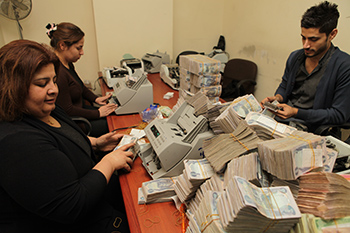 We are the largest asset manager of funds in Iraq. We have given a lot of loans to a variety of sectors in Iraq from agriculture to housing as well as giving bridge loans and loans for fulfilling contracts. We have lot of big loans with the car industry and we have worked successfully with them in importing thousands of cars to Iraq to then sell them to the retailers in the market and to the end users. We have a system now whereby people can come and buy cars and pay directly from their salaries. That system has made us very successful in this sector and we are hoping to do the same when we grow further in the housing industry.
We are the largest asset manager of funds in Iraq. We have given a lot of loans to a variety of sectors in Iraq from agriculture to housing as well as giving bridge loans and loans for fulfilling contracts. We have lot of big loans with the car industry and we have worked successfully with them in importing thousands of cars to Iraq to then sell them to the retailers in the market and to the end users. We have a system now whereby people can come and buy cars and pay directly from their salaries. That system has made us very successful in this sector and we are hoping to do the same when we grow further in the housing industry.
You have 5 branches in Baghdad which are generating about two thirds of you revenue. Baghdad is a very promising market for you. What are your plans for your Iraqi expansion?
You are right about Baghdad, it is the heart of the Iraqi economy and the heart of Iraqi business activities. However those revenues mentioned are due to the fact that our headquarters are in Baghdad and usually most of this revenue comes from opening letters of credit and guarantees that tend to go to the Ministries and obviously most of the Ministries are headquartered in Baghdad. All the contracts we have are eventually signed in Baghdad and so clients in other parts of the country have to deal with the Ministries and headquarters that are in Baghdad. Therefore it is correct that two thirds of our revenue comes from Baghdad but really it is because most of our business goes through our headquarters in Baghdad.
Baghdad has almost 7 million people and it is a very dynamic city. With all the problems it has, those 7 million people still have to go about their daily lives, they have to eat, they have to buy clothes, cars and houses etc. So there is a lot of activity there for us. We are planning to increase our branches from 5 to 10 in Baghdad in the next two years because there is need for them.
We have implemented almost 40 ATM machines inside Iraq in different places. Each branch has its own ATM machine and in major cities we are putting them in shopping centers and public places. They can provide 24 hour services in terms of receiving cash when the banks are closed. We are planning on increasing those numbers, we probably will have 3 or 4 times the number of ATM machines in the next 2 or 3 years.
For the year 2011, commission driven by trade related activities, wire transfers, letters of credit and FX spread accounting accounted for between 28% and 83% of the net revenues of banks in the sector. You have the highest percentage amongst all the banks of revenues generated from wire transfers, letters of credit and FX spreads, do you see this changing in the future? Where are the revenues going to come from?
The basic banking business today in Iraq is divided into local and foreign activities. The foreign activities basically relate to providing letters of credit and transferring money to the clients who import products.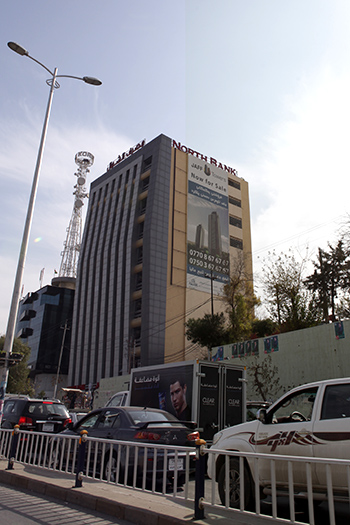 As you now, today we are still not able to open a letter of credit directly with major world banks because chapter VII of the embargo is still in effect. We basically have to go to local countries like Jordan, Lebanon, Emirates, Bahrain and Kuwait who are willing to take risks with us.
As you now, today we are still not able to open a letter of credit directly with major world banks because chapter VII of the embargo is still in effect. We basically have to go to local countries like Jordan, Lebanon, Emirates, Bahrain and Kuwait who are willing to take risks with us.
North Bank has the highest percentage of country risk for those countries which are willing to give credit to Iraq. For example in Jordan, we are probably regarded as by far the most trusted bank by the Jordanian banks. Therefore a lot of revenue is generated in this way. As you know Jordan and Dubai are the two major, important foreign countries for Iraqi business people because of the ports of Aqaba and Dubai. People mainly import their goods through these two major countries. Recently Turkey has also been very active in Iraq and so it has become the third source of goods and material to Iraq.
How do you see your stock price evolving in the future? Have you considered listing the company somewhere else where people can actually invest in shares?
All of this is related to when Iraq will actually become free from the sanctions. Officially the sanctions have been lifted, but these sanctions are still in effect in Iraq. Once the country´s risk is lifted because of the sanctions then I think we will look at listing our shares on the international market. However, that does’ mean that we do’ have international clients. We have the largest amount of shares owned by international investors of any bank in Iraq.
One of the criticisms made by Sensor Capital was that a large percentage of earnings are derived from foreign exchange activities which are likely to decrease significantly going forward. This was one of the major risks for North Bank. How do you address this issue?
Well it was mentioned to us and we looked at it seriously. We looked into those criticisms. However, we are now at the end of 2013 and nothing has changed or happened in Iraq so I think that those assumptions were incorrect. Even if those assumptions for any reason were to be correct in the near future, we are just providing services to our clients and it shows how much money is exchanging in Iraq today. One important thing to note is that the Iraqi private market is responsible for more than 80% of activities in Iraq. If I’m not mistaken the government contributes four to five billion dollars a year from the Trade Ministry, the rest of the activity is done by the private sector. In this regard, this type of work will continue until we have access to international banking systems that would free us from the Central Bank that controls those revenues. The Central Bank watches these revenues carefully, looking at how, where and why these monies are transferred. Because all of these transfers happened suddenly in 2012, people thought that by implementing tougher regulations they would shrink or stop or vanish. All these activities were not necessarily done exactly as the western world may have wanted, but it was needed for the daily business in Iraq. I’m sure each year we will grow more and find more acceptable ways rather than just going to the Central Bank and asking them to transfer these monies for us. I think that the assumptions that were made by some of our critics are down to the fact that they do’ really understand how people live and work inside Iraq.
The second risk was identified as a significant amount of loan losses from overdraft facilities.
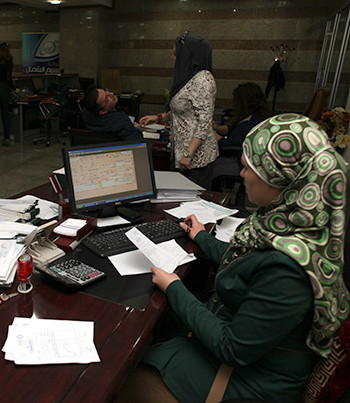 We have had last year and in previous years some loans which were not paid back. Those never amounted to a huge number. They were single digits of millions of dollars at the most. We still pursue those loans but it has no real effect because we lost a few million dollars because of bad drafts and loans but we had 28 billion dollars in terms of our provisions. Our provisions for those bad loans were much greater than what we paid for those loans. Each year we have contributed some percentage of our profits to make sure that we are on the right side. When people read the reports, they will see that last year in 2012 we had more than 28 billion dinars in provisions for bad loans. Essentially if I have 700 or 800 billion dinars in loans it is natural to lose 3 or 4 billion in those loans. However, each year when I make a profit I add to my provisions whether I need to or not, and this year we shall do the same. We will allocate some of our profits to provisions to make sure that we are ready for a rainy day.
We have had last year and in previous years some loans which were not paid back. Those never amounted to a huge number. They were single digits of millions of dollars at the most. We still pursue those loans but it has no real effect because we lost a few million dollars because of bad drafts and loans but we had 28 billion dollars in terms of our provisions. Our provisions for those bad loans were much greater than what we paid for those loans. Each year we have contributed some percentage of our profits to make sure that we are on the right side. When people read the reports, they will see that last year in 2012 we had more than 28 billion dinars in provisions for bad loans. Essentially if I have 700 or 800 billion dinars in loans it is natural to lose 3 or 4 billion in those loans. However, each year when I make a profit I add to my provisions whether I need to or not, and this year we shall do the same. We will allocate some of our profits to provisions to make sure that we are ready for a rainy day.
The third issue was the high level off balance sheet leverage, when you count the letters of credit and guarantees that are off balance they would eventually come to a very high loan to asset ratio, is that an issue for you?
We are often criticised by the market and the government who say that the private banks are not greatly involved in helping daily businesses in Iraq. We are proud to say that we have the highest amount of leverages that has helped a lot of people to manage their businesses in Iraq. All of these loans are very well and I repeat very well; they are backed up by the assets that we have from the clients that we have received. We chose the clients that come to us. We accept the criticism that we have high concentrations but these clients are big clients. When I make a 25 million dollar guarantee for a company called Asiacell, everyone knows how big Asiacell is and so 25 million is not such a huge risk. Other companies that are doing the infrastructural programs like the water treatment or refinery projects are big companies and we know the clients and their assets are even greater than ours. So the risks we take with them are backed up by the assets that these companies have. Luckily we have been fortunate enough to have no bad experiences with these people.
Can you highlight the latest updates on your financial performance?
2012 was probably the best year we have had in terms of the profits that we reached in our banking history. We probably wo’ reach the same amount in 2013 but it will be very close. The reason this is the political unrest in Iraq this year that made us slow the rate of our activities to make sure that we were safely covered due to the situation. As you have seen there was political unrest between parties, especially between the KRG and Baghdad. There was also a lot of political differences inside Baghdad itself; we heard it on the news every day and this made us slow down a little bit. We should have had a better year than 2012. Like all other normal banks we have our reserves and thus we tried to slow down. In no way does it mean that we are not growing. A lot of activities stopped because of these problems. Eleven or twelve Ministries in Iraq had no Ministers for a long time in 2013. The Ministers simply walked away from their offices and they were managed by provisional Ministers. This obviously slowed business in Iraq for the private sector because one of the major activities of the private sector here is working on the projects and contracts provided by the Ministries.
However I am happy to say that we are on the same path as we were in 2010, 2011 and 2012. We hope that in 2014 with better stability we should be able to reach our targets.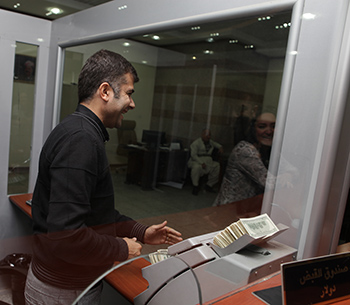
What do you think about the national switch, which means that you can withdraw from any ATM machine?
We have a project with Asiacell, called Asiaviolet, it is in its final stages however we have not received the approved yet from the Central Bank. We have not even done the final signatures with Asiacell because Asiacell has changed hands recently. The top leadership changed in 2013 and so we are still waiting to see what the new management would like to do in this regard.
In terms of the national switch, it is too early to be involved in inter banking relationships with other private banks in Iraq as the systems are not yet on the right footing.
You mentioned something very important, which is the fact that people come here and do these banking reports but they do’ actually understand the market. That is why some of the recommendations might be misleading. In your own words what are the things that people do’ understand about the Iraqi banking sector?
The Iraqi banking sector is a new sector in terms of private banking. In terms of banking in Iraq, we are probably the oldest country in the Middle East to have banking activities. We are older than all of our neighbors in terms of such banking systems. The problem is that as of 2003 we have had a new private banking sector but the security situation hasn´t allowed people to be here freely as much as we may want them to. They therefore basically look at the reports that they receive from their agents, or at newspaper reports or public sources. If they look at those reports they will see that North Bank is working in different sectors in Iraq. We have small, medium, large and giant clients. We can provide these “giant” clients with services and we can benefit from their trust and capital deposits, which can be huge, some of them even greater than our own capital. We have been very fortunate to have these “giant” clients. As they are “giant” they do a lot of business in Iraq and require a lot of services here. They have a lot of assets which means that we are not afraid to provide them with services. We are careful of course; unless we make sure that we are covered 100% we will not get involved in these matters. So I would say that the people who are skeptical of these things should come here and see the operations for themselves. Sometimes we have delegations coming from our corresponding banks to Iraq and they are surprised at how we are giving such credits but it was only in 2012 that they decided to come to Iraq based on our invitations to show them the operations, facilities, buildings etc. and they are very happy with what they have seen and with the decisions that we have made.